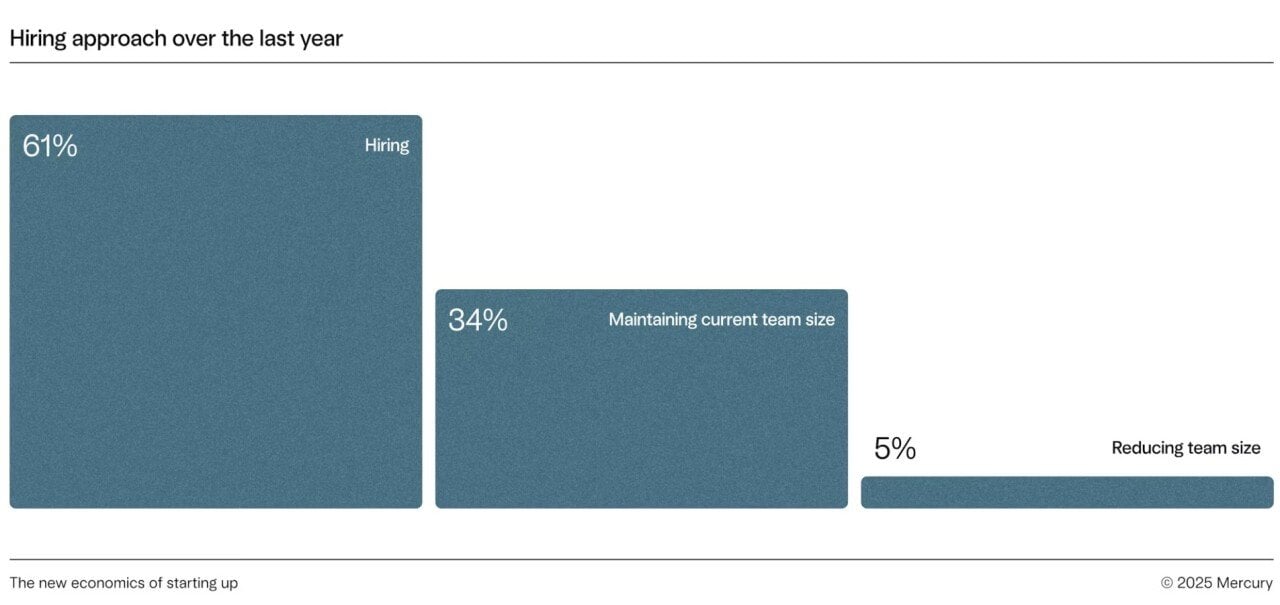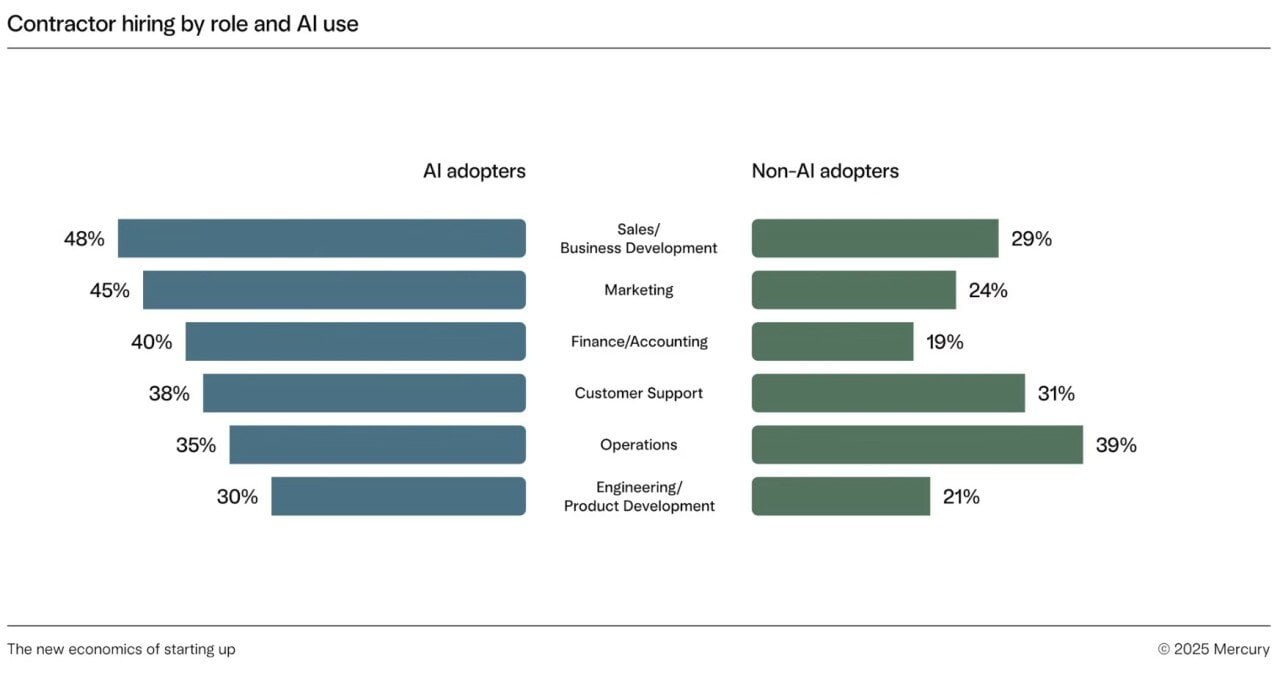Despite fears that artificial intelligence will replace workers, some businesses using the technology are doing the opposite. A recent Mercury survey of 1,500 early-stage entrepreneurs found that 68% of AI adopters are expanding their teams, even as two-thirds of startups report higher-than-expected costs in operations, sales and marketing. Overall, 79% of founders said they plan to increase spending in the year ahead — underscoring resilience and a shift in how AI is shaping growth, Mercury reports.
Hiring acceleration, not replacement for startups that adopt AI
AI adoption or not, 65% of respondents said talent acquisition costs rose in the last year — yet it didn’t appear to do much to slow down their hiring. In fact, when asked about the impact of market conditions on various areas of the business, hiring was the one most often left unchanged or only lightly adjusted.
Most surveyed companies were at least doing some hiring:

And job market doomers take note: 68% of companies using AI are actively scaling team size, which stands in pretty sharp contrast to the 13% of non-AI adopters actively scaling their teams. Moreover, 79% of companies with significant AI adoption said they’re hiring more because of it, and 61% of those who’ve had at least some AI adoption said the same. Moreover, only 3-4% of those AI users said they’re hiring some version of less.
Notably, AI-adopting companies reported increased hiring across growth-oriented roles:
- 44% business development
- 43% sales
- 42% marketing
- 42% customer service
Could these companies be using their AI efficiency gains to expand market reach rather than just maintaining current output with fewer people?
The survey highlights varying hiring patterns by industry:
- Retail/Wholesale AI adopters are doubling down on customer-facing roles — 59% are hiring in sales, 50% in customer service.
- Professional services are leaning into relationship-building — hiring in business development (48%) and marketing (47%).
- Manufacturing showed elevated hiring in legal/compliance (21%), potentially reflecting AI’s regulatory impact.
- Financial services focused heavily on, interestingly, finance (61%), with low hiring in design (8%) and EPD (12%) — suggesting AI is reinforcing core functions more than enabling digital transformation.
Contractor-enabled scale power agile teams
While many of these early-stage companies are prioritizing full-time hires, a majority are also turning to freelancers and consultants to fill gaps and stay nimble. 61% of those surveyed said their company is “very reliant” or “reliant” on contract talent, a model that seems to increasingly be a defining feature of modern startup operations.
Writ large, contractor usage was touted as a way to access specialized skills without long-term commitments — flexibility that could prove a strategic advantage in a less-than-predictable economy.
The data also showed some splits when looking at contractor usage in relation to AI adoption:
- AI-adopting companies showed significantly higher contractor usage across most business functions — particularly in growth-driving areas like sales and marketing. Non-AI adopters, however, leaned more on contractors for operations.
- 38% of entrepreneurs who said their company’s AI adoption was significant said they use contractors to access global talent, more than 2x the rate of non-AI adopters (15%).
- On the flip side, non-AI adopters were more likely to use contractors for temporary work needs (38% vs. 27% for AI adopters), suggesting some differing strategic approaches to workforce flexibility.
Here’s how these contract roles shake out by function:

In short: AI adopters seem to be more likely, overall, to use contractors, and more likely to deploy them in pursuit of growth. Non-AI adopters seem to be using them to keep the lights on a bit more, deploying them for functions like ops and customer support.
It’s also a question of degree. 45% of significant AI adopters said they’re “very reliant” on contractors, compared to just 12% of non-AI adopting companies — nearly a 4x difference.
- 69% of companies with significant AI adoption reported using contractors “much more” or “somewhat more” in the past year, compared to other companies, where contractor usage has remained largely static.
- Only 5% of these same companies said they were reducing contractor reliance.
- Taken together, these patterns suggest contractors are an increasingly essential component of team building today — especially for AI-forward companies that take a global view on talent.
Signs are promising that workers may gain from AI, not lose out
Rather than replacing workers, this report suggests that AI is reshaping how startups build teams. Founders adopting the technology are more likely to hire full-time staff, rely on contractors for growth-oriented work, and expand overall spending — even as costs climb. Taken together, the findings point to a workforce strategy that blends optimism, technology, and flexibility as startups navigate uncertain economic conditions.




















